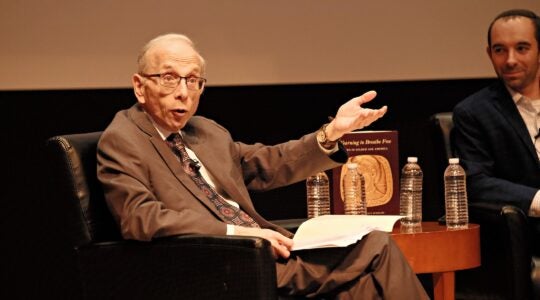For years, we tended to paper over a fundamental policy difference between Israel and the United States. Israeli Prime Minister Benjamin Netanyahu long has talked about the need to dismantle fully Iran’s nuclear infrastructure that he describes as constituting an existential threat to Israel, while President Obama’s language consistently called for preventing Iran from obtaining a nuclear weapon.
The former position, spelled out by Netanyahu in his congressional speech Tuesday, cannot tolerate the existence of thousands of spinning uranium enriching centrifuges and other elements of a nuclear program; the latter, which was articulated in National Security Adviser Susan Rice’s speech to AIPAC Monday night, is prepared to accept this situation on a limited basis, as long as there are strong safeguards in place to guarantee enrichment for peaceful purposes only for an extended period of time. It is worth noting that America’s Arab allies in the region, particularly Saudi Arabia and Egypt, seem to be more in line with Israel’s position on this issue.
Full disclosure: I was critical of Netanyahu’s decision to give his speech to a joint meeting of Congress absent coordination with the White House, rather than finding less confrontational ways to communicate his concerns to our decision-makers. The timing of the speech, coming just two weeks before Israel’s highly competitive national election, also is unfortunate. Inevitably, despite Netanyahu’s disclaimers, some have drawn the conclusion that it was as much motivated by politics as by policy. In response, as many as 57 congressional Democrats, many traditionally strong supporters of Israel, expressed their displeasure by not attending. It would be a serious mistake, in my judgment, to interpret their action as an expression of hostility to Israel. We have enough adversaries without creating new ones.
While he opened the speech effusively praising President Obama for all the “known” and “unknown” support he has given Israel since assuming the presidency, Netanyahu threw down the gauntlet by bluntly condemning the emerging deal being negotiated by the administration and the international community. Basing his assessment on information already a matter of public record, he described the deal as “very bad,” one which would actually “pave the way” toward Iran possessing a massive nuclear arsenal.
The major flaws, he observed, are two-fold. First, while it would impose some restrictions on enrichment, inspectors could not prevent violations, nor could they effectively monitor the actions of an untrustworthy Tehran regime that engages in “hide and cheat.” Second, he asserted that Iran could get to the bomb even by complying with the deal because, according to him, it would lift restrictions in 10 years without requiring Iran to change its behavior. Netanyahu argued for a performance-based standard for lifting restrictions — stop aggression against its Middle East neighbors, stop supporting global terrorism, and stop threatening to annihilate Israel. This unreformed militant Islamic regime, he asserted, will “always” be America’s enemy.
After recognizing Elie Wiesel sitting in the audience, Netanyahu ended his speech by referencing the Purim holiday and stressing that the Jewish people — perhaps with a veiled military implication — no longer will remain passive in the face of our genocidal enemies.
Reaction from the White House was swift and unequivocal. The speech was all “rhetoric,” offering nothing new. Undoubtedly, the administration will continue to make the case that the deal it envisions, while not perfect, is a good one, and that Netanyahu’s position is simply unrealistic and unattainable. The president personally offered an 11-minute rebuttal in an impromptu national television appearance, underscoring that U.S. foreign policy is run through the executive branch, “not other channels.” Frankly, one cannot escape the conclusion that the tensions of recent weeks just got a couple of notches tenser.
When controversy swirled around the interim agreement between Iran and the P5+1 powers in late 2013, I wrote in a column published here that we needed to look forward, not backward: “At bottom, both countries believe that Iran should be prevented from possessing the ingredients to easily produce a nuclear weapon. … Thus, our attention must shift to identifying with clarity and precision the elements of a comprehensive agreement that meets this objective and an acceptable timeframe for its achievement. It is absolutely critical that the United States and Israel coordinate positions…” Sadly, this did not happen. It would have been far better to engage these questions at the beginning of the negotiations over a year ago, not now, just days away from a possible breakthrough.
Will the speech help or hurt Netanyahu’s re-election bid? Only time will tell. Regardless, representatives of the P5+1 will continue pursuing negotiations with Iran with the goal of achieving a framework agreement by the end of this month and a comprehensive agreement by June. Certainly the speech will have the effect of igniting vigorous debate around the nature of the agreement.
Getting Iran’s nuclear issue right is crucial. But other important matters will engage us in the period ahead as well, from finding solutions to the festering Palestinian issue to dealing with Islamic State, Hezbollah, Hamas and the growing strength of radical Islamist groups throughout the region. We must not allow the current tensions between the Obama administration and the current Israeli prime minister to obscure the broad strategic objectives shared by these two democratic allies.
Those of us engaged in pro-Israel advocacy in the context of U.S. national interests — Democrats and Republicans, liberals and conservatives — will be challenged in the coming weeks to avoid partisanship, to protect the historically close and mutually beneficial U.S.-Israel relationship, and to concentrate with thoughtful and civil discourse on the momentous policy decisions that lie ahead. We will not know for years, maybe decades, whether Prime Minister Netanyahu’s dramatic appearance in Congress this week has contributed to or set back prudent decision-making. Much hangs in the balance.
Martin J. Raffel recently retired as senior vice president of the Jewish Council for Public Affairs (JCPA). He now consults for the JCPA and for the Israel Policy Forum.
The New York Jewish Week brings you the stories behind the headlines, keeping you connected to Jewish life in New York. Help sustain the reporting you trust by donating today.




